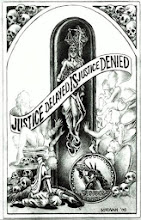Industry groups respond to Senate identity theft act
Washington DC -- July 05, 2005 -- (Posted at 16:45 Hours, EDT)
The following is excerpted from a response by Joseph Ricci on behalf of the mentioned organizations, relating to the introduction of the U.S. Senate's Personal Data Privacy and Security Act of 2005. To summarize, the Act would increase criminal penalties for identity theft, and would require companies to protect sensitive information about its customers."While the National Council of Investigation and Security Services (NCISS) and the Coalition of Security Associations for Privacy Protection support many of the provisions of this and other legislation, there are specific sections that would make it extremely costly for the judicial system, legal community, law enforcement, corporate security and private citizens to conduct daily business typically supported through the efforts of the nation's nearly 60,000 investigators.For example, Section 501 would prevent private investigators from accessing information which we need in order to serve the U.S. judicial system.
The bill's prohibition on the sale of Social Security numbers would limit our ability to locate witnesses, prevent fraud, locate heirs and pension beneficiaries and assist victims of identity theft. Certainly, these are unintended consequences of the legislation; however they will negatively impact the U.S. judicial system by making it less fair and its decisions less enforceable. The proposed legislation permits law enforcement to maintain access to Social Security numbers, while prohibiting the same access to investigators working for defense counsel. This delineation will put defendants at a further disadvantage in attempting to locate exculpatory witnesses.We believe that this well-intentioned legislation needs to be thoroughly reviewed, and not enacted solely to respond immediately to an avalanche of publicity. We support several provisions in the legislation, including increased penalties for identity thieves and prohibitions on using Social Security numbers on certain documents.
But private investigators are not to blame for the recent security breaches. The challenge for the 109th Congress is to enact legislation that responds to security breaches without adopting provisions that will be counterproductive to the fight against identity theft by damaging both the civil and criminal justice systems."
God Bless,
Dan'L
Washington DC -- July 05, 2005 -- (Posted at 16:45 Hours, EDT)
The following is excerpted from a response by Joseph Ricci on behalf of the mentioned organizations, relating to the introduction of the U.S. Senate's Personal Data Privacy and Security Act of 2005. To summarize, the Act would increase criminal penalties for identity theft, and would require companies to protect sensitive information about its customers."While the National Council of Investigation and Security Services (NCISS) and the Coalition of Security Associations for Privacy Protection support many of the provisions of this and other legislation, there are specific sections that would make it extremely costly for the judicial system, legal community, law enforcement, corporate security and private citizens to conduct daily business typically supported through the efforts of the nation's nearly 60,000 investigators.For example, Section 501 would prevent private investigators from accessing information which we need in order to serve the U.S. judicial system.
The bill's prohibition on the sale of Social Security numbers would limit our ability to locate witnesses, prevent fraud, locate heirs and pension beneficiaries and assist victims of identity theft. Certainly, these are unintended consequences of the legislation; however they will negatively impact the U.S. judicial system by making it less fair and its decisions less enforceable. The proposed legislation permits law enforcement to maintain access to Social Security numbers, while prohibiting the same access to investigators working for defense counsel. This delineation will put defendants at a further disadvantage in attempting to locate exculpatory witnesses.We believe that this well-intentioned legislation needs to be thoroughly reviewed, and not enacted solely to respond immediately to an avalanche of publicity. We support several provisions in the legislation, including increased penalties for identity thieves and prohibitions on using Social Security numbers on certain documents.
But private investigators are not to blame for the recent security breaches. The challenge for the 109th Congress is to enact legislation that responds to security breaches without adopting provisions that will be counterproductive to the fight against identity theft by damaging both the civil and criminal justice systems."
God Bless,
Dan'L


0 Comments:
Post a Comment
<< Home